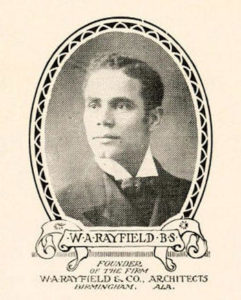
Wallace Rayfield
*Wallace Rayfield was born on this date in 1874. He was a Black architect.
Wallace Augustus Rayfield was born in Macon, Georgia, and attended local schools there. After his mother's death, he moved to Washington, DC. While attending Howard University, he apprenticed at an architectural firm. He then completed a graduate certificate from Pratt Institute before earning his bachelor's degree in architecture from Columbia University in 1899.
Upon graduation, he was recruited by Booker T. Washington to the Directorship of the Architectural and Mechanical Drawing Department at Tuskegee Institute in Alabama. In 1907, Rayfield opened a professional office in Tuskegee, from which he sold mail-order plans nationwide. He advertised in Birmingham, Montgomery, Mobile, Talladega, Alabama, Atlanta, Savannah, Macon, and Augusta, Georgia. That same year, he married his first wife, Jennie Hutchins, a Tuskegee student from Clarksville, Tennessee. Rayfield left Tuskegee Institute and moved to Birmingham in 1908 to focus on his practice. He brought glowing letters of recommendation from Washington and secured a $40 commission on his first day in the city. He appeared in that year's city directory at 109 Corrilla Street (now Center Place South).
Later that year, he constructed his residence at 105 1st Avenue South in Titusville. The house was designed, financed, and built entirely within the Black community (one of only ten such houses in Birmingham, according to historian Phillip W. Holland). The home featured a large stained-glass window and a special "architectural room" surrounded by windows on the attic level. Rayfield’s work as an architect entailed designing the most significant buildings in civil rights history, including 16th Street Baptist Church in 1911 and Ebenezer Baptist Church in 1914.
The Rayfields raised a daughter, Edith, there, attending Saint Mark's Episcopal Church. Mrs. Rayfield died in 1929 and was interred at Grace Hill Cemetery. During the Depression, it was impossible to keep ahead of business. On March 1, 1932, he married a widow, Bessie Fulwood Rogers. Rayfield led the group of prominent Black citizens that founded the South Elyton Civic League to improve the Titusville community. In his later years, Rayfield joined the Immaculate Conception Catholic Church on 6th Avenue South.
Wallace Rayfield suffered declining health and died of a stroke at his home on February 28, 1941. He is interred at Greenwood Cemetery in Woodlawn, Alabama. In 2010, the University of Alabama Press published a book that provides an overview of Rayfield’s life, with numerous photographs of buildings he designed and illustrations from drawings he used in his industrial drawing classes at Tuskegee. His book and the collection of Rayfield’s papers on which it is based have confirmed his standing as a pioneer African American architect.